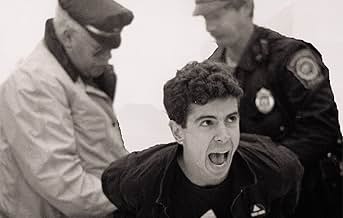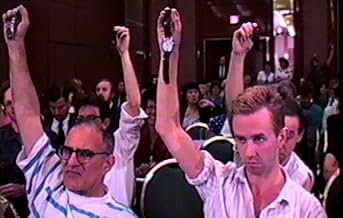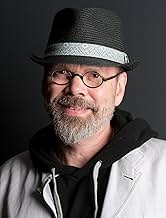IMDb RATING
7.6/10
4.5K
YOUR RATING
The story of two coalitions -- ACT UP and TAG (Treatment Action Group) -- whose activism and innovation turned AIDS from a death sentence into a manageable condition.The story of two coalitions -- ACT UP and TAG (Treatment Action Group) -- whose activism and innovation turned AIDS from a death sentence into a manageable condition.The story of two coalitions -- ACT UP and TAG (Treatment Action Group) -- whose activism and innovation turned AIDS from a death sentence into a manageable condition.
- Nominated for 1 Oscar
- 13 wins & 21 nominations total
Iris Long
- Self - Retired Chemist
- (archive footage)
- (as Iris Long PHD)
Bob Rafsky
- Self - PR Executive
- (archive footage)
Ed Koch
- Self - Mayor of New York
- (archive footage)
Barbara Starrett
- Self - AIDS Physician
- (as Dr. Barbara Starrett)
Franke-Ruta Garance
- Self - Teenager
- (as Garance Franke-Ruta)
Mathilde Krim
- Self - AMFAR, The Foundation for AIDS Research
- (as Mathilde Krim PHD)
Jesse Helms
- Self - R - North Carolina
- (archive footage)
Featured reviews
Seeing this title I was expecting something of an apocalyptic, end-of- the-world zombie type film. In fact, this documentary was far truer, exploring a disease which has cost many lives. One might say I have an interest in LGBT causes and maybe this is why I decided to see this documentary, but AIDS is not exclusive to any community.
This documentary starts in the early 80's in New York where young men and women are dying of AIDS. There is no treatment and they are even refused in the hospitals. Each with their individual pain couldn't do much so they organized and created "ACT UP" whose main focus was to be an activist group, which through civil disobedience would bring attention, awareness, and most importantly a cure to AIDS. The documentary retraces some of their fights and quarrels mostly through archives but also with some more recent interviews. It covers some of the darkest hours before the discovery of the lucky combination that would prolong the lives of many, but would come too late to save those of many more.
I think the topic is one of the most important there is. It feels so distant but I can actually remember hearing about a treatment to AIDS back then. It meant very little to me at the time. I can't say that I really loved the way the documentary was going about things but I liked the substance very much. It is very scary to think back and imagine those people taking whatever medication that was on trial simply because at that point it couldn't have done more harm.
While I think activism is double-edged blade and can sometimes backfire, it seems that this very activism has saved many lives and the alerted politicians who at first refused to talk about how many lives AIDS had taken. There are some very emotional personal stories here, and if my rating was based solely on the people in this documentary, I'd give them all a 10 for their courage and perseverance through this tremendous pain.
I liked: The topic. Historically important.
I disliked: The shaky archive footage, the constant shouting and confrontations. It had only one sequence to explain the actual biological/chemical aspects, which I felt were important and deserved more screen time.
74/100 A little over 20 years ago, there were presidents who would go on television and say that AIDS has behavioral causes that should be looked at. This documentary could definitely teach them a thing or two.
This documentary starts in the early 80's in New York where young men and women are dying of AIDS. There is no treatment and they are even refused in the hospitals. Each with their individual pain couldn't do much so they organized and created "ACT UP" whose main focus was to be an activist group, which through civil disobedience would bring attention, awareness, and most importantly a cure to AIDS. The documentary retraces some of their fights and quarrels mostly through archives but also with some more recent interviews. It covers some of the darkest hours before the discovery of the lucky combination that would prolong the lives of many, but would come too late to save those of many more.
I think the topic is one of the most important there is. It feels so distant but I can actually remember hearing about a treatment to AIDS back then. It meant very little to me at the time. I can't say that I really loved the way the documentary was going about things but I liked the substance very much. It is very scary to think back and imagine those people taking whatever medication that was on trial simply because at that point it couldn't have done more harm.
While I think activism is double-edged blade and can sometimes backfire, it seems that this very activism has saved many lives and the alerted politicians who at first refused to talk about how many lives AIDS had taken. There are some very emotional personal stories here, and if my rating was based solely on the people in this documentary, I'd give them all a 10 for their courage and perseverance through this tremendous pain.
I liked: The topic. Historically important.
I disliked: The shaky archive footage, the constant shouting and confrontations. It had only one sequence to explain the actual biological/chemical aspects, which I felt were important and deserved more screen time.
74/100 A little over 20 years ago, there were presidents who would go on television and say that AIDS has behavioral causes that should be looked at. This documentary could definitely teach them a thing or two.
That seeming rarity: an incisive, heartfelt documentary about people doing good that is important, even today as AIDS is not the 'plague' it once was. It shows what people will do when they are pushed to a limit - it's not even about gay rights but about human rights, for proper health-care for the deathly ill. It's filmmaking that doesn't shy away from the rougher areas - when there is infighting in ACT UP, the director (first timer David France) shows it warts and all. But it's the heroism by the likes of Peter Staley and Mark Harrington that shines through the most. As Roger Ebert said, it's most emotional for the audience with a drama when seeing good people suffer, as do the people in ACT UP and in the AIDS crisis, and in doing good, against all odds.
We get the sense that they were not just fighting for themselves, though that was certainly a big component, but fighting for the millions that needed the medicine that could at least be attempted. The saddest part is seeing the trial and error over the years, where people who did take the early drugs like ATX just didn't get better like they should've. It's a bittersweet conclusion since by the time the medicine did get to the point where AIDS was at least something people could try and not, you know, kill them, so many had already passed (the ticker per-year that comes up becomes more and more shocking, albeit a lot of these numbers were from Africa). As a document of the AIDS/HIV crisis and as a pure protest movie and 'Fight the Powers That Be!' saga, it's moving, harsh, and keeps its story moving with compelling people who faced up to the fact that their fight had to be about science even before it being a social issue.
Oh, and the sort of 'reveal' you don't even expect in the last ten or so minutes... it shoots this up to being essential viewing.
We get the sense that they were not just fighting for themselves, though that was certainly a big component, but fighting for the millions that needed the medicine that could at least be attempted. The saddest part is seeing the trial and error over the years, where people who did take the early drugs like ATX just didn't get better like they should've. It's a bittersweet conclusion since by the time the medicine did get to the point where AIDS was at least something people could try and not, you know, kill them, so many had already passed (the ticker per-year that comes up becomes more and more shocking, albeit a lot of these numbers were from Africa). As a document of the AIDS/HIV crisis and as a pure protest movie and 'Fight the Powers That Be!' saga, it's moving, harsh, and keeps its story moving with compelling people who faced up to the fact that their fight had to be about science even before it being a social issue.
Oh, and the sort of 'reveal' you don't even expect in the last ten or so minutes... it shoots this up to being essential viewing.
How to Survive a Plague is definitely one of the year's most awe-inspiring, riveting, go-into- action documentaries. Through a mightily informative combination of recent interviews and archival footage the film exhibits a noteworthy fight against both ignorance and indifference towards such a deadly epidemic as the one caused by the HIV virus. This is also a serious, heartfelt, touching depiction of a movement that was ready to change something, even if it meant sacrificing a few soldiers along the way. And yes, the word 'soldiers' is perfectly suitable when it comes to all those young people who devoted their whole lives to a global, far-reaching cause.
Year by year, How to Survive a Plague presents a through and insightful look at the actions that propelled the LGBT activists in some of their most tragic days. Undeniably, the story behind such coalitions as Act Up and TAG are exhilarating ones. Even though the then-deadly virus already infected many of those young people, they still didn't lose faith in the cause and decided to stand up against the government and its reluctance to help those in need. Lead by a few charismatic and devoted individuals Act Up changed to course of history and it's definitely not an exaggeration. By making the whole world aware of the seriousness of this ferocious AIDS plague the activists made the world a place friendly for all inhabitants of this planet, no matter their sexual orientation or skin color.
How to Survive a Plague is a clever, intriguing and fortifying documentary. Every scene of the film matters, every voice raised is a significant one. Decidedly so, the interviews shine a new light on the past events presented in the archival footage, and their coming together combines for a valuable film experience.
Year by year, How to Survive a Plague presents a through and insightful look at the actions that propelled the LGBT activists in some of their most tragic days. Undeniably, the story behind such coalitions as Act Up and TAG are exhilarating ones. Even though the then-deadly virus already infected many of those young people, they still didn't lose faith in the cause and decided to stand up against the government and its reluctance to help those in need. Lead by a few charismatic and devoted individuals Act Up changed to course of history and it's definitely not an exaggeration. By making the whole world aware of the seriousness of this ferocious AIDS plague the activists made the world a place friendly for all inhabitants of this planet, no matter their sexual orientation or skin color.
How to Survive a Plague is a clever, intriguing and fortifying documentary. Every scene of the film matters, every voice raised is a significant one. Decidedly so, the interviews shine a new light on the past events presented in the archival footage, and their coming together combines for a valuable film experience.
This film is recommended.
David France's documentary, How To Survive A Plague, chronicles the devastating effect of AIDS upon the gay community from the mid eighties to present day. Through archival footage and direct interviews with activists and patients who fought against government bureaucracy, homophobia, and ignorance, the film also shows the history and political beginnings of gay, lesbian, and trans-genders who formed a group called ACT UP. This organization courageously battled the FDA, pharmaceutical companies, politicians, and hate- mongers, like Jesse Helms and his ilk, to try to stop this disease from reaching epidemic proportions with protest marches, sit-ins, and angry demonstrations to make the world aware of the severity of the problem.
The film covers nearly two decades of public outcry and disdain for the lack of tolerance and expediency in preventing this scourge. At times, the documentary shows some of the protests against various institutions like the Roman Catholic Church, Ronald Reagan and George Bush, and Congress in sketchy terms with some details lacking. But in general, the film succeeds in painting a clear picture of these average citizens forced to become activists due to a lack of insight and compassion from those in power, those elected officials who chose to look the other way until the disease started to target the general public.
How To Survive A Plague is an angry film, as well it should be. It profiles these heroic people whom continually found strength in each other while losing friends and loved ones in the process. This historic film helps to set the record straight as it shows their tragic tales without any bias or grandstanding. How To Survive A Plague becomes a life-affirming testament for those that lived and those that survived in the struggle against adversity and bigotry while keeping its focus on the dignity of a human life and a sense of equality and justice for all. GRADE: B
Visit my blog at: www.dearmoviegoer.com
ANY COMMENTS: Please contact me at: jadepietro@rcn.com
NOTE: Although a cure has been found to delay the fatality of this disease, the cost factor remains exorbitantly high for most average middle-class people. And so the fight continues...
David France's documentary, How To Survive A Plague, chronicles the devastating effect of AIDS upon the gay community from the mid eighties to present day. Through archival footage and direct interviews with activists and patients who fought against government bureaucracy, homophobia, and ignorance, the film also shows the history and political beginnings of gay, lesbian, and trans-genders who formed a group called ACT UP. This organization courageously battled the FDA, pharmaceutical companies, politicians, and hate- mongers, like Jesse Helms and his ilk, to try to stop this disease from reaching epidemic proportions with protest marches, sit-ins, and angry demonstrations to make the world aware of the severity of the problem.
The film covers nearly two decades of public outcry and disdain for the lack of tolerance and expediency in preventing this scourge. At times, the documentary shows some of the protests against various institutions like the Roman Catholic Church, Ronald Reagan and George Bush, and Congress in sketchy terms with some details lacking. But in general, the film succeeds in painting a clear picture of these average citizens forced to become activists due to a lack of insight and compassion from those in power, those elected officials who chose to look the other way until the disease started to target the general public.
How To Survive A Plague is an angry film, as well it should be. It profiles these heroic people whom continually found strength in each other while losing friends and loved ones in the process. This historic film helps to set the record straight as it shows their tragic tales without any bias or grandstanding. How To Survive A Plague becomes a life-affirming testament for those that lived and those that survived in the struggle against adversity and bigotry while keeping its focus on the dignity of a human life and a sense of equality and justice for all. GRADE: B
Visit my blog at: www.dearmoviegoer.com
ANY COMMENTS: Please contact me at: jadepietro@rcn.com
NOTE: Although a cure has been found to delay the fatality of this disease, the cost factor remains exorbitantly high for most average middle-class people. And so the fight continues...
"How to Survive a Plague" takes real footage from the 1980s and 90s fight for health among the homosexual community and allows us to accurately re-live the tragedy of the rise of AIDS worldwide and the political incompetence to do anything about it. Part of the excellence of this documentary is allowing the actual events to speak for themselves. These activists had the foresight to record their conversations and protests, and these filmmakers had to foresight to know how to edit it to leave the power in the hands of those fighting.
AIDS Coalition to Unleash Power (ACT UP) was formed in New York in 1987. Establishing Larry Kramer as its spokesperson was one of the many smart moves this advocacy group made. He's well-spoken and he knows his facts. Approximately half-way through the film, Larry stands up and delivers a speech so Earth-shatteringly accurate, simple and poignant that the entire audience in the room and the entire audience for the film are left speechless.
There are times during this fight where the group dissipates and internal disagreements arise, and even though a separate group formed, this community stuck together and the emergence of TAG (Treatment Action Group) just doubled their efforts and accomplishments. AIDS patient and homosexual activist Peter Staley was one of the heroes of the film and is likely a personal hero to many. At the beginning, he was young, passionate and out-spoken but he knew his facts and could beat any politician in a debate. Just because he was gay, dying of AIDS and inexperienced doesn't mean he doesn't know what needs to get done and doesn't mean he doesn't know how to do it. Although these struggles took place 20 years ago, it's still inspiring.
They fought against the Catholic Church and judging by the look on the Bishop's face, they won. They fought against the FDA, and won. They fought against the NIH, and didn't really win. They fought against President George H.W. Bush, and the result was basically pounding their head against a brick wall, but at least they made out on his golf course lawn. They fought against President Bill Clinton, and at least they learned their lesson about debating a Rhodes Scholar. More importantly, they learned that it doesn't have to be a fight, and all advocacy, political and governmental groups worked in harmony. But by this time, it was indeed a plague and survival was the only option.
The film had some fascinating facts but unfortunately they were written with a flickering green font on a grey cityscape background and were barely legible. But listen to what they have to say, and ACT UP and TAG will teach you "How to Survive a Plague".
AIDS Coalition to Unleash Power (ACT UP) was formed in New York in 1987. Establishing Larry Kramer as its spokesperson was one of the many smart moves this advocacy group made. He's well-spoken and he knows his facts. Approximately half-way through the film, Larry stands up and delivers a speech so Earth-shatteringly accurate, simple and poignant that the entire audience in the room and the entire audience for the film are left speechless.
There are times during this fight where the group dissipates and internal disagreements arise, and even though a separate group formed, this community stuck together and the emergence of TAG (Treatment Action Group) just doubled their efforts and accomplishments. AIDS patient and homosexual activist Peter Staley was one of the heroes of the film and is likely a personal hero to many. At the beginning, he was young, passionate and out-spoken but he knew his facts and could beat any politician in a debate. Just because he was gay, dying of AIDS and inexperienced doesn't mean he doesn't know what needs to get done and doesn't mean he doesn't know how to do it. Although these struggles took place 20 years ago, it's still inspiring.
They fought against the Catholic Church and judging by the look on the Bishop's face, they won. They fought against the FDA, and won. They fought against the NIH, and didn't really win. They fought against President George H.W. Bush, and the result was basically pounding their head against a brick wall, but at least they made out on his golf course lawn. They fought against President Bill Clinton, and at least they learned their lesson about debating a Rhodes Scholar. More importantly, they learned that it doesn't have to be a fight, and all advocacy, political and governmental groups worked in harmony. But by this time, it was indeed a plague and survival was the only option.
The film had some fascinating facts but unfortunately they were written with a flickering green font on a grey cityscape background and were barely legible. But listen to what they have to say, and ACT UP and TAG will teach you "How to Survive a Plague".
Did you know
- Quotes
Larry Kramer: [addressing to an angry protester] Plague! We're in the middle of a fucking plague, and you behave like this? ACT UP has been taken over by a lunatic fringe!
- ConnectionsFeatured in La 85e cérémonie des Oscars (2013)
- SoundtracksThat's Us/Wild Combination
Performed & Arranged by 'Superhuman Happiness'
Written by Arthur Russell (as Charles Arthur Russell Jr.) (ASCAP)
Courtesy of Domino Publishing Company Ltd.
- How long is How to Survive a Plague?Powered by Alexa
Details
- Release date
- Country of origin
- Official sites
- Language
- Also known as
- Làm thế nào để sống sót trong bệnh dịch
- Production companies
- See more company credits at IMDbPro
Box office
- Gross US & Canada
- $132,055
- Opening weekend US & Canada
- $28,250
- Sep 23, 2012
- Gross worldwide
- $132,055
Contribute to this page
Suggest an edit or add missing content


















